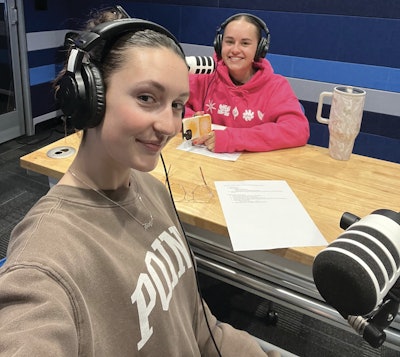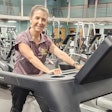
Sometimes, we make things harder than they need to be. Take articulating the value of campus recreation. It’s such a broad topic, yet J.C. Miller puts it so succinctly.
“The primary value of campus rec is an opportunity for involvement and play — and their trickle-down effect, particularly that play piece,” says the assistant director of outdoor recreation for Louisiana State University. “I believe that participation in team-building programs, for example, or in competitive sports or whatever you’re doing, where there is a sense of community, does not have any inherent negative repercussions. We’re talking about young adults that are learning to network and connect with other people.”
Fortunately, Miller adds, the majority of today’s college and university students see such value in campus recreation. And ongoing outreach through both traditional and less-conventional means — from creating rec-related podcasts to installing ellipticals in libraries — helps keep physical and mental wellbeing top of mind for students while also reminding them that involvement and play are, indeed, critical elements of the student experience.
“Back in the day, campus recreation was an afterthought,” says Kathleen Hatch, a 35-year industry veteran who is the Morrison Family Associate Vice President for Student Well-Being at Kansas State University and the 2023 recipient of NIRSA’s Honor Award. “We’ve gone from auxiliary, adjacent partner to an essential ingredient in learning and success. Recreation is critical and foundational for a healthy campus environment — one that supports students’ experiences and develops habits for a healthy life.
“Rec helps everyone value movement and being outside. It can help students manage stress and even help us to reshape our own limits.”
The value of campus recreation is so strong that Baily Kruzan, who worked in the tourism industry after receiving a Master of Business Administration degree, decided to switch careers because of her own experience as a club volleyball player at the University of Wisconsin-Stevens Point.
“I loved playing club volleyball, but I didn’t think campus rec was actually a job that I could have,” says Kruzan, who actually got a job in campus rec in 2023 as the Utah State University recreation department’s marketing coordinator. “I’m one of the younger people on our staff, and I love being able to talk with students and tell them about my experience with campus rec and everything I gained, letting them know how it can add to their lives.”
Miller, Hatch and Kruzan — three campus recreation professionals, each in different stages of their careers but all with the same mission to connect with students daily and consistently convey what campus recreation adds to the student experience.
Says Hatch, “We all are working to create conditions for everybody to be at their best.”
Calls to action
Hatch views creating those conditions as vital to what was a new position at Kansas State when she arrived in 2021. She brings a holistic view to campus recreation, bridging the gap between her department and others on campus to enhance the student body’s collective wellbeing. For example, she has partnered with the university’s student health and counseling services to identify students who could benefit from physical activities and, with those students’ permission, paired them with a campus recreation fitness specialist. She also worked to place ellipticals, exercise bikes, yoga mats and exercise balls in the Hale Library.
“We weren’t expecting a student to hop on a stationary bike for a 90-minute workout,” Hatch says. “But we had QR codes that helped the student understand that, ‘Hey, for five minutes, I can reset my brain right now. I can do this nice and quietly and get right back to my books.’ We didn’t have high utilization initially, but as a result, the engineering program and the College of Business both asked us for exercise equipment to place in their buildings.”
For Hatch, conveying the value of campus recreation involved figuring out how to remove barriers for students by bringing that value directly to them.
Kruzan, meanwhile, seeks to attract new campus recreation participants via “The Rec Room” podcast, which premiered in January. Each episode features Kruzan and at least one student employee discussing a wide range of topics that include wellness, health and fitness issues, as well as fun events and programs. Guests have included representatives from Utah State’s mental health services department, the campus rec aquatics coordinator and an outdoors program student trip leader. Kruzan’s wish list for future guests includes representatives from the Student Nutrition Access Center on campus and the HURD, Utah State’s student section at home athletic events.
New 25- to 40-minute episodes of “The Rec Room” are recorded at the campus radio station and debut every two weeks or so (including during the summer), and it takes about three to four hours to plan, record and edit an episode. Video footage of the recordings are posted on the campus recreation department’s social media platforms.
“We’re slowly getting the word out about it,” Kruzan says. “I think people still wonder, ‘What is the rec center going to talk about on a podcast?’ But we definitely have a base of listeners. One of my big goals this coming school year is to really push the podcast to the incoming freshmen class. That way, it’ll be something that they just know is there, something they expect — not something new that they have to go out of their way to find. We want to keep releasing episodes, and we know we can build momentum.”
Once students embrace the value of campus recreation, it’s important to keep them engaged, which is why Miller has made the outdoor recreation programs at Louisiana State more accessible to all students. Whereas in the past, outdoor recreation — then dubbed “adventure education” — typically involved dayslong trips in the remote backcountry where there was no cellphone service or easy access to professional medical care, they now consist of frequent daytrips to public camping areas.
“Students are able to engage with these programs and get all the benefits of being outside, learning how to set up a tent, pack a bear bag, paddle on the water — all these outdoor skills — without being put past their point of comfortability,” Miller says. “We want to put them in a challenge zone, not a panic zone.”
The result? A direct correlation between higher participation rates and fewer miles driven. Plus, outdoor recreation at the university now encompasses everything from challenge courses to paranormal history tours of New Orleans. And most experiences are free for students.
“We can change how our brains function by spending as little as five minutes outside,” Hatch says. “It can reset our cognitive function, and that is something I never would have articulated early in my career. Being outside — moving, playing, getting up to something, getting dirty — all of those things, in some ways, are basic calls to action.”





































